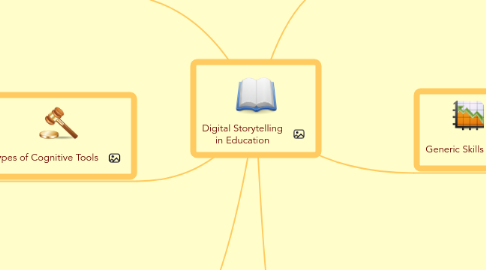
1. Types of Cognitive Tools
1.1. Concept Map
1.1.1. Mind Meister
1.2. Web Development
1.2.1. Vote & Forum
1.3. Presentation
1.3.1. PhotoStory Software
1.3.2. Vimeo for digital story sharing
1.4. Interactive Learning Tools
1.4.1. Google Docs for collaborative writing
1.4.2. Voice Thread for giving comments
2. Technology on Learning
2.1. Learning From Technology
2.1.1. Use of Computer Resources
2.1.1.1. Online Search (Information Retrieval)
2.1.1.2. PhotoStory software
2.2. Learning with Technology
2.2.1. Use of Interactive Learning Objects
2.2.1.1. Voice Thread
2.2.2. Use of Cognitive Tools
2.2.2.1. Story Mind Map
2.2.3. Use of On-line Collaboration Technology
2.2.3.1. Google Docs
3. Roth, C. et al. (2009) Interactive Storytelling 5 Conceptual Building Blocks
3.1. Curiosity
3.2. Suspense
3.3. Aesthetic pleasantness
3.4. Self-enhancement
3.5. Optimal task engagement (“Flow”)
4. Learning Theory-Constructivism
4.1. Characteristics
4.1.1. All knowledge is actively constructed by learners
4.1.2. An adaptive process to learn: Collect ideas--> Use ideas--> Construct own knowledge
4.1.3. Contruct knoweldge through assimilation & accommodation
4.1.4. Use existing knowledge to build new knowledge
4.1.5. L.S. Vygotsky Culture is the main determinant of cognitive development
4.2. Implications
4.2.1. Constructivist teachers give directions to guide students to discuss
4.2.2. By classroom discussion, students gain the skills of knowledge construction
4.2.3. Create a classroom environment for students to construct knowledges under individual social basis
4.2.4. develop students' creative thinking
